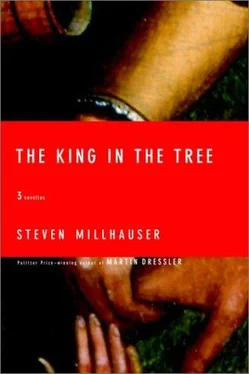Dr. Centlivre, with his powdery frock, his watch in its polished silver case, and his melancholy eyes, had visited Mary in her sitting room, and had left behind a small brown bottle and strict orders for plenty of bed rest and no mental agitation. Juan wondered which would agitate her less: his absence, his presence, his speech, his silence, his coolness, his kindness— but he was so sunk in apathy, a restless, feverish sort of apathy, a nervous languor, a drowsy sluggish fire of leaping and falling feeling, that it was all he could do to put one foot in front of the other, after which you were supposed to put the first foot in front of that — an absurd succession of slow deliberate footsteps, leading with maniacal precision to inevitable death.
Late one night when Juan was sitting before his casement window, staring out at the glimmer of distant river under the moon, he became aware of a figure moving on the lawn below. It was white, with whiteness shimmering around its head, and Juan’s first impression was that a ghost such as he had often read about in his childhood had come floating out of a book in the library and was drifting across the grass. A moment later he recognized Mary’s walk and her cap of Brussels lace. He hesitated long enough to see her turn into the plum orchard; then he stepped up onto the windowsill, climbed partway down the wall, and leaped softly onto the grass.
He followed her at twenty paces through the orchard and the coppice of beech trees and entered a darker place, where paths wound among yew trees and weathered statues with broken forearms and decaying shoulders. Juan passed a headless woman with two broken arms who stood in the heavy marble folds of a moss-covered mantle, baring to the moon a single broken breast. Beside her in the grass lay her upturned head. At a dark pool rimmed with crumbling stone he stopped. Mary, white and black in the moonlight, like a drawing in a book, stood on one of the cushioned seats carved into the roots of the great oak. She was touching the tree with both hands, caressing the bark as if she had come out for a midnight tryst with a lover who had been turned into a tree. Suddenly something stirred and Juan saw the door in the tree begin to open. Mary stepped up and disappeared into the oak. Juan strode along the length of the pond, stumbling on something white that might have been a marble arm, stepped onto the cushion in the carved root-seat, and climbed up into the hollow tree.
Dim moonlight falling through the leaves of the oak revealed a stone stairway going down. Juan made his way down the turning stairs, which wound around a column of stone. As the moonlight rose above his head the darkness became blacker, until he felt that he was pushing his way through a thickening mass of blackness as palpable as feathers. He pressed one hand against the central column and one against the concave wall. Below he heard a steady soft silken sound, like a distant rustle of high grass stirred by a wind; he imagined Mary’s wide gown brushing against the column and the wall, dragging behind her on the turning steps. His hand dislodged a bit of stone, which fell clicking on the stairs and suddenly stopped. As he descended he had the sense that he was dissolving in a solution of blackness, that soon there would be nothing left: one day on a stone stair in a hollow tree forgotten by generations of squires a young woman with gray-green eyes who happened to be walking in the woods would discover a ring, a skull, a rusty sword.
Now the darkness seemed to become thinner, as if it had been penetrated by an alien substance, a faint light glimmered, and when he came to the bottom he could see a passageway stretching off to the left and right.
Here and there dim lanterns in wall niches gave off a gloomy half-light. He saw Mary turning out of sight along the winding path, from which other passageways branched off on both sides. Hood had spoken of his system of passageways, and Juan imagined a vast underpark of crisscrossing paths, connected to the upper park by circular stairways emerging in grottoes, rotundas, ruins, summerhouses, tea pavilions, hollow statues and trees. Mary turned into another passageway. The path became broader; Juan noticed a narrow rivulet running along one side. The streambed sank lower, the water widened, and when he turned a bend Juan saw Mary stepping into a boat. The oarsman stood high on one end, holding his oar; the boat was long and narrow and curved upward at bow and stern. As the oarsman began to push off, Juan stepped into the boat and sank into the dark cushions of the seat across from Mary.
“Why, Sir Juan! You must be a dream — or a ghost. You’re pale as a ghost — so wan, Sir Juan! — oh, I shall call you Sir Wan. I really do think you must be a ghost, after all. So am I, too: the ghost of Mary Hood. You remember Mary Hood. First she was glad, then she was bad, and then she was very, very sad. And now she has disappeared! Indeed, I cannot find her anywhere. Nothing left but us ghosts, Sir Juan. That is what happens to us, once we disappear. And we can never never rest because — because — oh, I forget why we can never rest. ’Tis our punishment, I think. For our wicked thoughts. Do dons ever have wicked thoughts, Sir Don? Oh, my.”
The boat had rounded a sharp bend and was entering a broad waterway. There were the great palazzi, looming in the torchlit dark; there were the arched bridges, the stone steps leading into the water, the passing gondolas, the masked revelers. Hood had even fashioned a night sky of twinkling lights, a round moon, and blue-black clouds. “ ’Tis but recently begun,” Mary Hood said. “Augustus was hoping to surprise you. I heard him speaking of it to Georgiana. Georgiana thinks I am too much alone. And yet I do not lack society. My thoughts are my daily companions, and at night — why, at night I lie down with Despair. Oh, Johnny had a wife, and a right fine wife, and yet she was a maid, Sir. And how that may be, I cannot cannot tell, and fol de rol de rol, Sir. Georgiana says — oh, look.”
Mary was pointing to a gondola in which a young lord wearing a plumed hat sat leaning back against the cushions. Hood had captured everything: the cut of the sleeve, the insolent grace of the man, a certain tilt of the face as he said something to his gondolier, who wore a straw hat set back on his head. The face was perhaps too youthful, too lovely in a languorous way, but the line of the nose, the slope of the forehead, the small sharp beard, all composed a remarkable likeness. A masked woman in a passing gondola called out to the young lord, who turned his head in her direction and spoke a few words. In every gesture of his face and hands he revealed the supreme confidence of a man accustomed to the attentions of women. He laughed lightly as he turned away — and Juan, startled by the sound, and pressing himself down on the cushions so as not to be seen, tried to remember when it was that he had last felt laughter rush through his throat.
“Do you suppose she is happy?” Mary was saying, as a band of revelers burst into shouts of laughter on a nearby bridge; and when Juan turned to look at her, he saw that she was gazing after the masked woman with sorrowing eyes.
“Pray, that way,” Mary said to her gondolier. They were approaching a building where an arched doorway with an iron portcullis came down to the water. The portcullis rose as they drew near, and the gondola entered a watery courtyard bounded by stony ground strewn with trestles, buckets, and barrels. Long wooden beams slanted up from the ground and rested high against the back of the palazzo facade. The inner surface was unfinished; in the light of lanterns Juan could see the unpainted boards, which on the outside had been painted to resemble ancient stone. At a small pier an old man with a boat hook pulled them in. Juan followed Mary out of the gondola and up a flight of rickety wooden steps that led to a winding passageway. Under a dim lantern an arch revealed a stone stair. He climbed behind her, round and round, and now he had the sense that the darkness was unraveling and trailing behind him, fold after fold, until it lay at the bottom in a heavy black pile. He smelled leaves; a moment later he emerged behind Mary through a door in a tree on the bank of the Ymber, far upstream.
Читать дальше












